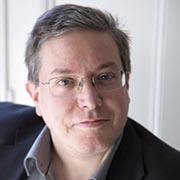Saving everything for opera. The English composer Julian Anderson pours all his experience into Thebans, which receives its world premiere on 3 May at English National Opera.
There can be few events in a composer’s life more thrilling than the birth of an opera. In Julian Anderson’s case it appears everything has been pointing to this moment. Following prodigious talent and international acclaim in just about every major genre – orchestral, choral, ensemble, chamber, dance – at 46 Anderson is about to release his first opera, Thebans. It is a timeless and thrilling tale: Anderson has collaborated with his librettist, the celebrated playwright Frank McGuinness, to re-work Sophocles’ Oedipus trilogy, a myth filled with murder and incest, political ambition, love and loyalty.
What in particular attracted you to the Oedipus tale?
One of the most important aspects of this trilogy lies in the fact that none of its characters are perfect. At one end of the scale you have the elderly Oedipus at the seemingly wise end of his life, who nonetheless speaks a terrible curse upon his own son. And at the other, you have Creon who is appallingly flawed and brutal, but has equally attractive and persuasive qualities. These inconsistencies are what fuel the music. Opera is a rare medium where multiple meanings coexist simultaneously; where a character’s words can tell you one thing, but the music tells you another. From the first moment I read the Oedipus plays I was immediately struck by the feeling that these characters needed to sing.
How much have you stuck to Sophocles’ narrative and how has that informed the way your music unfolds?
My opera represents Sophocles’ three plays as one grand narrative. Act 1 covers Oedipus’ time as arrogant king of the plague ridden city of Thebes and his subsequent fall from grace as he becomes the scapegoat for the city’s ills. The music changes with his character. Act 2 races forward in time to when Creon has taken charge of the city. He is a suave and persuasive speaker who preaches simple answers with Stalin-esque consequences for Thebes’ citizens. The music here is initially very rigid, with restricted rhythmic writing, but breaks down into something much more flowing as the people rebel. Finally Act 3 returns in time to the point of Oedipus’ death in a sacred wood outside Athens. He searches for an ending just as the music searches for a place to return to. As he finally steps forward into a great light, the music gathers itself into an almighty crescendo; emphatic, yet on the point of something else…
You have gained respect in many genres, especially your vivid orchestral writing and natural affinity for choral music. How have you gone about writing for orchestra and chorus in the opera?
From the start ENO wanted a work that would use all their forces, especially the chorus and Thebans uses the chorus in many different guises. In Act 1 they are in dialogue with the characters and commentate on the action. In Act 2 they aid, abet and argue, starting as victims singing in a mindless obedient way before breaking rank as chaos ensues. In Act 3 the chorus is entirely off-stage and their ethereal voices conjure up nature and the voice of God.
The role of the orchestra is even more important. It adds another voice to the drama; one that can subvert just as much as it supports. For instance, there are moments when two characters are locked in tension, but I hold back the orchestra deliberately, only later does it erupt. It’s important to constantly think dramatically and this has stretched my musical vocabulary, making me think and reflect. This is thrilling; in fact this project has been the greatest thrill of my life.
The opera has been commissioned by English National Opera and the much-anticipated premiere will be given in London on 3 May 2014. The superb creative team includes director Pierre Audi, conductor Edward Gardner and an outstanding cast: Roland Wood as the tormented Oedipus, Susan Bickley as his wife/mother Jocasta, Julia Sporsén as the doomed Antigone, and Peter Hoare as Creon.
The opera is a co-production with Theater Bonn which will give the German premiere in May 2015.
(Faber Music)
(from [t]akte 1/2014)



